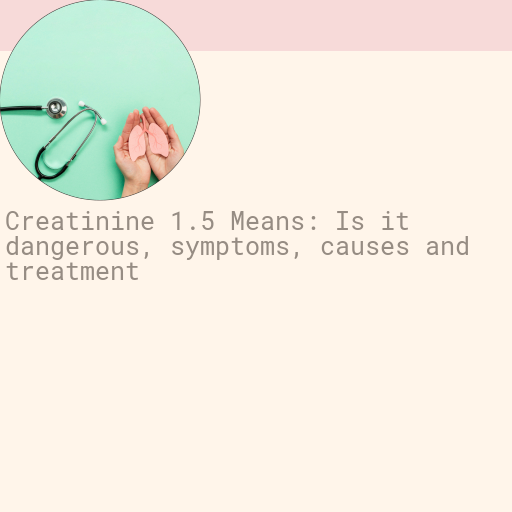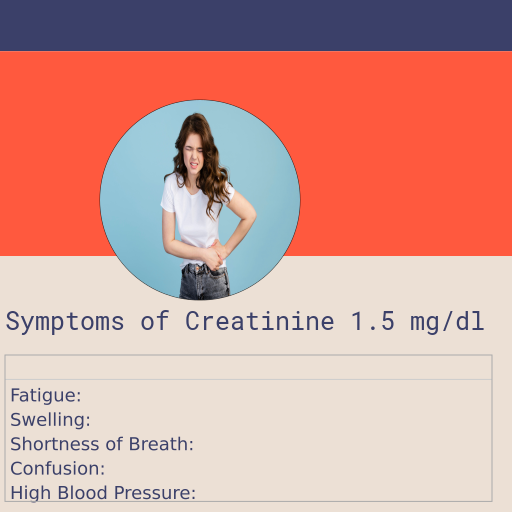Creatinine 1.5 : Is it Dangerous, Causes, Symptoms and More
When it comes to understanding our health, few metrics are as revealing as creatinine levels. Creatinine is a waste product produced by muscles, and its levels in the blood can offer crucial insights into kidney function. A creatinine level of 1.5 may not seem alarming at first glance, but it can be a signal of underlying health issues. Elevated creatinine levels can be caused by various factors, including dehydration, kidney disease, and even high-protein diets. Recognizing the symptoms such as fatigue, swelling, and changes in urination is essential for early detection and treatment. In this blog, we'll delve into the potential dangers of a creatinine level of 1.5, explore its causes, and discuss the symptoms and treatment options available.

What is Creatinine
Creatinine is a byproduct of protein breakdown and is a waste product that has no use in the body. It is produced from the normal wear and tear on muscles and is filtered out of the blood by the kidneys. Because it serves no useful purpose in the body, elevated levels of creatinine can be an indicator of potential kidney issues, as it suggests that the kidneys are not effectively removing this waste. Monitoring creatinine levels is crucial for assessing kidney health and ensuring that the body's waste removal processes are functioning properly.
- Muscle Metabolism: Creatinine is a byproduct of the normal breakdown of muscle tissue. As muscles use energy, they produce creatinine, which enters the bloodstream.
- Dietary Intake: Consuming meat or other animal products can contribute to higher creatinine levels, as these foods contain creatine, which is converted into creatinine.
- Creatine Supplements: Individuals who take creatine supplements for bodybuilding or athletic performance may have higher levels of creatinine due to increased creatine intake.
- Kidney Function: The kidneys are responsible for filtering creatinine out of the blood. Impaired kidney function can lead to elevated creatinine levels, as the body is unable to efficiently remove it.
- Medications: Certain medications can affect creatinine levels either by impairing kidney function or by altering muscle metabolism.
- Dehydration: Inadequate hydration can lead to concentrated blood and higher levels of creatinine, as there is less fluid available to dilute waste products.
- Physical Activity: Intense physical activity can temporarily increase creatinine levels due to the breakdown of muscle tissue.
Normal Range of Creatinine in Adults
In adults, the normal range of creatinine levels typically falls between 0.6 to 1.2 milligrams per deciliter (mg/dL) for men and 0.5 to 1.1 mg/dL for women. These values can vary slightly based on the laboratory and the individual’s muscle mass, age, and sex. Maintaining creatinine levels within this range is crucial as it indicates the proper functioning of the kidneys. Elevated or decreased creatinine levels can be a sign of underlying health issues that may require medical attention.
| Age Group | Normal Creatinine Range (mg/dL) |
|---|---|
| Infants | 0.2 - 0.4 |
| Toddlers (1-3 years) | 0.3 - 0.7 |
| Children (3-10 years) | 0.5 - 1.0 |
| Adolescents (10-18 years) | 0.5 - 1.1 |
| Adults (Male) | 0.6 - 1.2 |
| Adults (Female) | 0.5 - 1.1 |
| Older Adults (65+ years) | 0.6 - 1.3 |
Causes of Creatinine 1.5
Elevated creatinine levels can be a cause for concern, as they often indicate underlying health issues related to kidney function. Creatinine is a waste product produced by muscle metabolism and is typically filtered out of the blood by the kidneys. When kidney function is impaired, creatinine levels can rise, signaling potential problems. Common causes of elevated creatinine include chronic kidney disease (CKD), acute kidney injury, dehydration, and certain medications. Understanding these causes is crucial for addressing and managing elevated creatinine levels effectively.
- Kidney Disease: Chronic kidney disease or acute kidney injury can cause elevated creatinine levels due to impaired kidney function.
- Dehydration: Severe dehydration can lead to increased creatinine levels as there is less fluid available to dilute the creatinine in the blood.
- High Protein Diet: Consuming an excessive amount of protein can temporarily elevate creatinine levels.
- Medications: Certain drugs, such as nonsteroidal anti-inflammatory drugs (NSAIDs) and some antibiotics, can affect kidney function and raise creatinine levels.
- Muscle Damage: Conditions like rhabdomyolysis, where muscle tissue breaks down rapidly, can lead to a significant increase in creatinine.
- Severe Infections: Infections such as sepsis can cause kidney damage and result in elevated creatinine levels.
- Diabetes: Poorly controlled diabetes can lead to diabetic nephropathy, a complication that affects kidney function and raises creatinine levels.
- Heart Conditions: Congestive heart failure and other cardiac issues can reduce blood flow to the kidneys, leading to elevated creatinine levels.

Symptoms of Creatinine 1.5
When creatinine levels rise above the typical range, it often indicates an underlying health issue that needs attention. Elevated creatinine can manifest through a range of symptoms which may include fatigue, swelling in various parts of the body, and changes in urination patterns such as reduced urine output or dark-colored urine. These symptoms can be subtle initially but may escalate if the underlying cause is not addressed. Recognizing these signs early can be crucial for timely intervention and management.
- Fatigue: Elevated creatinine can lead to feelings of tiredness and a lack of energy.
- Swelling: Noticeable swelling in the face, ankles, or hands can occur due to fluid retention.
- Shortness of Breath: Difficulty breathing can be a sign of kidney dysfunction affecting lung function.
- Confusion: Mental fog or confusion may indicate that toxins are not being effectively filtered from the blood.
- High Blood Pressure: Elevated creatinine levels can be associated with hypertension.
- Frequent Urination: Needing to urinate more often, especially at night, can be a symptom.
- Loss of Appetite: A reduced desire to eat can be linked to kidney issues affecting digestion.
- Nausea and Vomiting: Feeling nauseous or vomiting can result from the accumulation of waste products in the body.

Dangers of Creatinine 1.5
Creatinine is a waste product formed by the normal breakdown of muscle tissue, and while it itself does not directly affect the body, elevated levels of creatinine in the blood can be a significant indicator of underlying health issues. High creatinine levels often point to kidney dysfunction or failure, meaning that the kidneys are not effectively filtering waste from the blood. When the kidneys are compromised, other waste products like urea can accumulate, leading to a range of harmful effects on the body, including toxicity and systemic complications. Therefore, monitoring creatinine levels is crucial for early detection and management of potential kidney issues.
- Kidneys: Elevated creatinine levels can indicate kidney dysfunction or chronic kidney disease, which can lead to further kidney damage if not addressed.
- Heart: High creatinine can be a sign of cardiovascular issues, potentially leading to hypertension and an increased risk of heart attacks.
- Liver: Although not directly related, elevated creatinine may indicate liver impairment, as the liver plays a role in processing waste products from the blood.
- Muscles: High creatinine levels could be due to muscle breakdown or rhabdomyolysis, which can cause muscle pain and weakness.
- Lungs: Respiratory complications can arise due to fluid overload from impaired kidney function, leading to pulmonary edema or shortness of breath.
- Nervous System: Elevated creatinine can lead to neurological symptoms such as confusion, seizures, and in severe cases, coma, due to the buildup of toxins in the blood.
- Gastrointestinal Tract: High creatinine levels can cause nausea, vomiting, and loss of appetite, which can further complicate overall health.
- Skin: Kidney dysfunction associated with high creatinine can cause itching and dry skin, making it uncomfortable for the patient.
Home remedies for Creatinine 1.5
Disclaimer: Elevation in creatinine levels cannot be effectively treated at home. It is crucial to seek medical attention for proper diagnosis and management. Basic supportive care, such as maintaining adequate hydration and following a balanced diet, can aid in overall kidney health, but these measures are not substitutes for professional treatment. Always consult with a healthcare provider for appropriate assessment and intervention to address the underlying causes of elevated creatinine.
- Stay Hydrated: Drinking plenty of water helps to keep your kidneys functioning properly and can assist in flushing out toxins.
- Adopt a Low-Sodium Diet: Reducing your salt intake can lower blood pressure and reduce the strain on your kidneys.
- Monitor Protein Intake: Consuming moderate amounts of protein can help manage kidney function, as excessive protein can put extra stress on the kidneys.
- Engage in Regular Exercise: Physical activity can help control blood pressure and blood sugar levels, which are essential for maintaining healthy kidney function.
- Avoid Over-the-Counter Pain Relievers: Certain medications, like NSAIDs, can be harmful to the kidneys. Opt for alternative pain management methods if possible.
Treatment for Creatinine 1.5
When creatinine levels reach 1.5, seeking medical treatment by a doctor is crucial. The primary treatment goals include stabilizing kidney function, discontinuing any harmful medications, and addressing underlying issues such as infections. By targeting these areas, doctors aim to prevent further kidney damage and promote overall health.
- Hydration: Increasing water intake is essential for helping the kidneys flush out toxins and lower creatinine levels.
- Dietary Changes: Reducing protein, salt, and phosphorus intake can alleviate kidney strain and help manage creatinine levels.
- Medications: Doctors may prescribe medications to address underlying conditions such as hypertension or diabetes that could be affecting kidney function.
- Regular Monitoring: Frequent monitoring of kidney function and creatinine levels can help track progress and make necessary adjustments to the treatment plan.
- Lifestyle Modifications: Adopting a healthier lifestyle, including regular exercise, quitting smoking, and avoiding excessive alcohol consumption, can improve overall kidney health.
GFR with Creatinine of 1.5
When discussing kidney health, it's essential to introduce the concept of Glomerular Filtration Rate (GFR), which measures how well your kidneys filter blood. Unlike the absolute value of creatinine, which can fluctuate based on various factors like muscle mass and diet, GFR provides a more accurate assessment of kidney function. This is because GFR takes into account age, sex, and body size, offering a comprehensive picture of how efficiently your kidneys are working. Therefore, while a creatinine level of 1.5 might raise concerns, understanding the GFR can give a clearer indication of whether there's a real issue with kidney function.
| Grade | GFR (mL/min/1.73 m²) | Meaning |
|---|---|---|
| G1 | > 90 | Normal or high |
| G2 | 60-89 | Mildly decreased |
| G3a | 45-59 | Mild to moderately decreased |
| G3b | 30-44 | Moderately to severely decreased |
| G4 | 15-29 | Severely decreased |
| G5 | < 15 | Kidney failure |
What is my GFR for a creatinine of 1.5
| Age | Gender | GFR |
|---|---|---|
| 18 | male | 60.95 ml/m2 |
| 45 | male | 50.61 ml/m2 |
| 60 | male | 47.74 ml/m2 |
| 80 | male | 45.03 ml/m2 |
| 18 | female | 45.23 ml/m2 |
| 45 | female | 37.55 ml/m2 |
| 60 | female | 35.42 ml/m2 |
| 80 | female | 33.41 ml/m2 |
Table of danger posed by Creatinine 1.5 in male across different ages
| Age Group | Is Creatinne of 1.5 dangerous? |
|---|---|
| 25yrs - 81 yrs | significantly high, but not dangerous, needs attention |
| 81yrs - 95 yrs | bad, and could be dangerous, Consult a doctor |
Table of danger posed by Creatinine 1.5 in female across different ages
| Age Group | Is Creatinne of 1.5 dangerous? |
|---|---|
| 25yrs - 95 yrs | bad, and could be dangerous, Consult a doctor |

Which other tests should be done for a creatinine value of 1.5?
In addition to monitoring creatinine levels, healthcare providers often recommend other diagnostic tests to get a comprehensive picture of kidney health. These tests may include electrolytes, which measure essential minerals in the blood such as sodium, potassium, and chloride, crucial for maintaining fluid balance and muscle function. A renal profile can provide detailed information about various aspects of kidney function, including blood urea nitrogen (BUN) and glomerular filtration rate (GFR). Additionally, blood gas levels can be assessed to determine the oxygen and carbon dioxide levels in the blood, which can be affected by kidney dysfunction. Together, these tests offer a more complete understanding of kidney health and help in diagnosing and managing potential kidney-related issues.
- Electrolytes: These tests measure the levels of essential minerals like sodium, potassium, chloride, and bicarbonate in the blood. It's crucial for assessing the body's fluid balance, kidney function, and acid-base balance.
- Renal Profile: A comprehensive panel that includes not just creatinine, but also other indicators like blood urea nitrogen (BUN) and glomerular filtration rate (GFR). This profile provides a more detailed picture of renal health and function.
- Blood Gas Levels: This test measures the amounts of oxygen and carbon dioxide in the blood. It also checks the pH level, which can be affected by kidney function and is important for diagnosing metabolic and respiratory conditions.
- HbA1c: This test measures the average blood sugar levels over the past 2-3 months. Elevated HbA1c levels can indicate diabetes, which is a major risk factor for kidney disease.
- LDH: Lactate dehydrogenase (LDH) is an enzyme found in almost all body tissues. High levels can indicate tissue damage, which may be relevant in cases of kidney disease and other underlying conditions.
- Urea: This test measures the amount of urea nitrogen in the blood. Elevated levels can indicate poor kidney function and are often measured alongside creatinine to assess renal health.
- Liver Enzymes: Tests like ALT, AST, and ALP assess liver function. Since kidney and liver functions are often interconnected, abnormalities in liver enzymes can provide additional insights into overall health.

 By: Dr.Bhargav Raut
By: Dr.Bhargav Raut